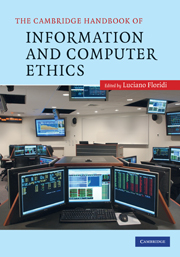Book contents
- Frontmatter
- Contents
- List of contributors
- Preface
- Acknowledgements
- Part I Introduction and background
- Part II Ethical approaches
- Part III Ethical issues in the information society
- Part IV Ethical issues in artificial contexts
- 12 The ethics of IT-artefacts
- 13 Artificial life, artificial agents, virtual realities: technologies of autonomous agency
- 14 On new technologies
- Part V Metaethics
- Epilogue: The ethics of the information society in a globalized world
- References
- Index
13 - Artificial life, artificial agents, virtual realities: technologies of autonomous agency
Published online by Cambridge University Press: 05 June 2012
- Frontmatter
- Contents
- List of contributors
- Preface
- Acknowledgements
- Part I Introduction and background
- Part II Ethical approaches
- Part III Ethical issues in the information society
- Part IV Ethical issues in artificial contexts
- 12 The ethics of IT-artefacts
- 13 Artificial life, artificial agents, virtual realities: technologies of autonomous agency
- 14 On new technologies
- Part V Metaethics
- Epilogue: The ethics of the information society in a globalized world
- References
- Index
Summary
Introduction
This chapter discusses ethical issues arising in connection with artificial life (non carbon-based), artificial agents (physically embodied robots and software agents or ‘bots’) and virtual reality. To different degrees, each of these technologies has a tinge of science fiction, but they are nevertheless all far enough advanced to raise current and pressing ethical issues. Each of them can be considered in the context of general ethical issues raised by philosophers of technology. These include worries about unintended harms, ranging from incremental erosion of human freedom and dignity as a result of over-dependence on machines, to the danger of a huge catastrophe by technological failure. They also include general worries about the difficulty of assessing risks and rewards of technological development, and about the potential of technology to concentrate political and economic power in the hands of those who have privileged access or technical knowledge, creating a de facto technocracy or fostering economic injustice.
The specific ethical issues on which this chapter is focused arise from the potential for autonomous agency that is afforded by computational agents and environments. The chapter begins with a brief survey of the technologies involved, subdividing both artificial agents and virtual reality to produce a list of five different kinds of technology. Next comes a discussion of the notion of autonomy as it applies to people and to information-processing artefacts. The ethical issues arising in the context of each of the five technologies are then described, followed by some concluding remarks.
Keywords
- Type
- Chapter
- Information
- The Cambridge Handbook of Information and Computer Ethics , pp. 219 - 233Publisher: Cambridge University PressPrint publication year: 2010
- 8
- Cited by



